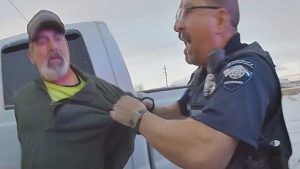by Bill Knowles
With the release of an Environmental Assessment study this past month, the Army and the Department of Defense have once again raised the specter of expansion of the maneuver site. The World Journal is launching a new series: Southern Colorado Under Siege, which will be looking at the land and the vision the ranchers and farmers hold for it as well as the vision the Army has for it…
TRINIDAD- Over 100 ranchers and concerned citizens showed up at the Sullivan Student Center at Trinidad State Junior College last Thursday evening for the process of making public comments on a just released Environmental Assessment (EA) compiled by Fort Carson. It was the second time in a week that the U.S. Army has heard from residents of southeast Colorado.
Many in attendance were also at the Wednesday meeting held in La Junta, voicing concerns that the DOD was attempting to restart its expansion of Pinon Canyon Maneuver Site through the release of the EA. With the possibility of expansion once again on the table, many in attendance began renewing friendships forged in the fights with the Army over the same issues five years ago.
Many at Thursday’s meeting recalled the original fight from the early 80s that first drew this group of patriots together. The struggle involves the paticipants in a strange dichotomy: a determination to stop the Army from expanding onto ranches that have been in the hands of families for generations and a deep patriotic desire to support the troops engaged in the fight against terror.
“My grandfather lost his ranch to the Army in 1981. Now everytime he looks out across the land he feels sad,” said Jenny Walters, President of the FFA and a senior at Hoehne High School. “Hoehne FFA is against PCMS expansion by all means.”
Others who spoke into the record recalled the dust bowl of the 1930s when unsustainable farming practices dried out the land. They talked about how tons of top soil were lifted from the earth when the winds blew which formed brown walls thousands of feet high and hundreds of miles long that were driven as far east as Chicago. Now many fear that a drought along with 60-ton tanks churning up the soil will cause the fragile ground to be pulverized just as badly as did the plowing of dirt farmers in the 30s.
“When I look at the ground and the condition some of it is still in from the 1930s, seeing that it has taken 80 years for it to begin to heal from the abuse, I realize that it will be another hundred years before we see the earth heal from the abuse it is receiving today. Once the grass on this high plains prairie is destroyed, it can’t be replaced. These are native grasses, adapted to the environment, that support native species of wildlife. We just can’t throw grass seed and expect it to heal up over the course of a year or two. It doesn’t happen that way,” Donna Smeller, told the crowd. Smeller was one of many area residents who spoke for the record.
Others see the EA as a backdoor to expansion along with a covenant that Colonel Robert McLaughlin of Fort Carson has been asking elected officials in southeastern Colorado to sign stating that the communities support the troops. The Department of Defense and the U.S. Army already have an Environmental Impact Statement, a much more comprehensive study then an Environmental Assessment. That has many ranchers and farmers wondering why the military has put together the 2011 EA.
The EIS was released in 2007 and resulted in a lawsuit being brought against the Department of Defense and the Army by Not 1 More Acre! Judge Robert Matsch of the 9th U.S. Court in Denver ruled in 2009 the Army as deficient for using the 2007 EIS to justify its Record of Decision for the proposed training increase. The Record of Decision to increase training levels, according to Matsch, was arbitrary, capricious and an abuse of discretion by the Army. He invalidated the Record of Decision. However training at PCMS was not invalidated by the court decision.
Another element adding to the mistrust people are feeling towards the Army is the issue of a waiver that allows the military to pursue expansion of PCMS. This waiver was granted by the DOD in 2007 after it had banned any DOD agency from buying large amounts of land. After a congressionally ordered investigation, the Government Accountability Office (GAO) determined that many omissions were evident in the waiver request. According to the Army’s own procedures, local public approval should have been given prior to any DOD approval of the waiver. Yet, this public approval was never sought or approved according to information from the Pinon Canyon Expansion Opposition Coalition.
At the moment the Army doesn’t have money in its budget to purchase any land for the expansion of PCMS and won’t have for five years according to Colonel McLaughlin. However the locals in Trinidad want the military to promise, in writing, that they will never again seek land for the maneuver site. It’s a promise that the Army can’t or won’t make. Such promises would tie the hands of future commanders and the current commander refuses to do that.
The opposition to any possible plans the military may have to expand the maneuver site is a grass roots movement started by ranchers near Kim five years ago, and like the wind that blows across the prairie, the movement has spread, drawing in politicians and galvanizing residents in small towns and cities across southeastern Colorado.

Breaking news: Results of Walsenburg Mayor race and recall election
Gary M. Vezzani was elected Walsenburg’s mayor in Tuesday’s special mayoral election/recall vote. Preliminary results announced Tuesday night show that both Nick Vigil in Ward



